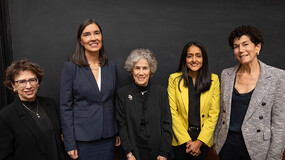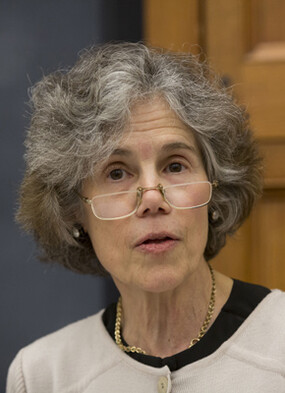Judith Resnik
J.D., New York University School of Law, 1975
B.A., Bryn Mawr College, 1972
- Federal and State Courts
- Liman Project
J.D., New York University School of Law, 1975
B.A., Bryn Mawr College, 1972
Judith Resnik is the Arthur Liman Professor of Law at Yale Law School and the Founding Director of the Arthur Liman Center for Public Interest Law. She teaches courses on federalism, procedure, courts, prisons, equality, and citizenship. Her scholarship focuses on the relationship of democratic values to government services such as courts, prisons, and post offices; the role of collective redress and class actions; contemporary conflicts over privatization; the relationships of states to citizens and non-citizens; the interaction among federal, state, and tribal courts and the forms and norms of federalism; practices of punishment; and equality and gender.
Resnik's forthcoming book, “Impermissible Punishments: How Prison Became a Problem for Democracy,” will be published by the University of Chicago Press in the summer of 2025. The question she poses is whether prisons can escape their ties to plantations and concentration camps. The book charts the invention of the corrections profession that imposed radical restrictions on human movement as if doing so was normal. Resnik weaves together the Enlightenment insistence that punishment be “purposeful,” the stories of people who debated how to punish, and the stories of people living under the regimes that resulted. She excavates the first-ever international rules aiming to improve the treatment of prisoners, which the League of Nations adopted in 1934 as the Nazis rose to power. Her trans-Atlantic account documents the impact of World War II, the United Nations, the U.S. Civil Rights movement, and of pioneering prisoners who insisted law protected their dignity as individuals. Resnik maps the results, including a trial in the United States about the constitutionality of whipping, which was Arkansas’ preferred “discipline” in the 1960s. This book traces the constitutional challenges thereafter to hyper-crowded cells, filth, violence, and profound isolation, as well as the cross-border expansion of the prison industry, waves of abolition efforts, and the impact of legal precepts rejecting “excessive,” “cruel and unusual,” and “degrading” sanctions. Exploring the interdependency of people in and out of prisons, Resnik argues that governments committed to equality cannot set out to ruin people. Therefore, many contemporary forms of punishment need to end.
Resnik’s other books include “Representing Justice: Invention, Controversy, and Rights in City-States and Democratic Courtrooms” (with Dennis Curtis, Yale University Press, 2011); (reissued 2022 as an ebook); “Federal Courts Stories” (co-edited with Vicki C. Jackson, Foundation Press, 2010); “Migrations and Mobilities: Citizenship, Borders, and Gender” (co-edited with Seyla Benhabib, NYU, 2009), and “Courts and Their Alternatives” (with Owen Fiss)(Foundation Press, 2003). In 2014, Resnik was the co-editor (with Linda Greenhouse) of the Daedalus volume, The Invention of Courts.
In the fall of 2022, Yale Law School hosted a conference to mark the anniversary of Judith Resnik’s first law review article, “Managerial Judges,” published in the Harvard Law Review in 1982 and analyzing transformations in the role of judges; the 2022 convening centered on contemporary challenges faced by people seeking legal remedies and the need to reconfigure court processes. The symposium articles, including her essay, “Seeing ‘The Courts’: Managerial Judges, Empty Courtrooms, Chaotic Courthouses, and Judicial Legitimacy from the 1980s to the 2020s,” were published in 2024 as part of three volumes in the Review of Litigation.
Recent book chapters include “Courts: A Template and A Site of Transitional Justice Collapsing as a Model,” in The Oxford Handbook of Transitional Justice (Jens Meierhenrich, Alexander Hinton, and Lawrence Douglas, eds., Oxford University Press, online; print 2025); Procedure, Contract, Public Authority, Autonomy, Aggregate Litigation, and Power (with Helen Hershkoff) in “Contractualisation of Civil Litigation in the United States” (Anna Nylund & Antonio Cabral eds., Intersentia, 2023); Tolerating Harms of Detention: With and Without COVID-19 (with Jaimie Meyer and Marisol Orihuela), in “COVID-19 and the Law: Disruption, Impact, and Legacy” (2023); Class in Courts: Incomplete Equality’s Challenges for the Legitimacy of Procedural Systems in “A Guide to Civil Procedure: Integrating Critical Legal Perspectives” (Brooke Coleman, Suzette Malveaux, Portia Pedro, and Elizabeth Porter, eds., 2022); Constituting a Civil Legal System Called “Just”: Law, Money, Power, and Publicity, in “New Pathways to Civil Justice in Europe” (Xandra Kramer, Alexandre Biard, Jos Hoevenaars, and Erlis Themeli, eds., Springer, 2021); Not Isolating Isolation, in “Solitary Confinement: History, Effects, and Pathways to Reform” (Jules Lobel and Peter Scharff-Smith, eds., Oxford University Press, 2020); and Judicial Methods of Mediating Conflicts: Recognizing and Accommodating Differences in “Pluralist Legal Regimes in Judicial Power: How Constitutional Courts Affect Political Transformations” (Christine Landfried, ed., Cambridge University Press, 2019).
Recent articles include “The Capital of and the Investments in Courts, State and Federal,” in New York University Law Review, 2024; “Lawyerless Litigants, Filing Fees, Transaction Costs, and the Federal Courts: Learning from SCALES” (co-authored) in the Northwestern University Law Review, 2024; “Constraining and Licensing Arbitrariness: The Stakes in Debates About Substantive-Procedural Due Process” (with Helen Hershkoff), in SMU Law Review 2023; “Representing What? Gender, Race, Class, and the Struggle for the Identity and the Legitimacy of Courts” in Law and Ethics of Human Rights (2021); “Punishment in Prison: Constituting the ‘Normal’ and the ‘Atypical’ in Solitary and Other Forms of Confinement” (co-authored), in Northwestern Law Review, 2020; “(Un)Constitutional Punishments: Eighth Amendment Silos, Penological Purposes, and People’s ‘Ruin,’” in the Yale Law Journal Forum online, 2020; and “Collective Preclusion and Inaccessible Arbitration: Data, Non-Disclosure, and Public Knowledge” (co-authored) in Lewis & Clark Law Review, 2020.
\In 2018, Resnik received an Andrew Carnegie Fellowship, a two-year award to enable her to do research for her book, “Impermissible Punishments.” That year, she also was awarded an honorary doctorate from University College London, and she was a visiting scholar at the Max Planck Institute for Procedural Law, in Luxembourg.
From 2012-2022, Resnik chaired Yale Law School’s Global Constitutional Law Seminar, a part of the Gruber Program on Global Justice and Women’s Rights. This annual private seminar brought together a small number of jurists from around the world to discuss the challenges of constitutional adjudication. When she became the chair, Resnik edited volumes of readings, available without charge as e-books; the series ran from 2012 to 2022 and included “Weighing Judicial Authority” (2022) and “Urgency and Legitimacy” (2021). Resnik founded Yale’s Arthur Liman Center for Public Interest Law, which supports one-year fellowships for Yale Law School graduates as well as summer fellowships for students at Barnard, Brown, Bryn Mawr, Harvard, Morehouse, Princeton, Spelman, Stanford, and Yale. From its inception in 1997 and as of the summer of 2025, more than 200 graduates of Yale Law School have held Liman fellowships. The Liman Center teaches a seminar each year; topics vary and have included Racial Justice and Immigrants’ Rights, Criminal Systems at a Crossroads, and Imprisoned: From Conception and Construction to Abolition. The Liman Center also hosts an annual colloquium to bring together scholars, students, lawyers, social scientists, current and former Liman Fellows, and other experts to address issues in criminal and civil law reform and legal education.
In 2015, the Association of State Correctional Administrators (ASCA), now called the Correctional Leaders Association (CLA), and the Liman Center co-authored Time-in-Cell: The ASCA-Liman 2014 National Survey of Administrative Segregation in Prison. The report was the first to provide information based on reports from correctional systems about the numbers of people held in isolation (then estimated to be 80,000 to 100,000) and the conditions under which they live. Follow-up surveys provide a unique longitudinal database on the use of what correctional officials call “restrictive housing.” The reports include Aiming to Reduce Time-In-Cell: Reports from Correctional Systems on the Numbers of Prisoners in Restricted Housing and on the Potential of Policy Changes to Bring About Reforms (2016); Rethinking Death Row (2016); Reforming Restrictive Housing: The 2018 ASCA-Liman Nationwide Survey of Time-in-Cell, and its companion volume, Working to Limit Restrictive Housing: Efforts in Four Jurisdictions to Make Changes, both published in 2018, Time-in-Cell 2019: A Snapshot of Restrictive Housing, the volume Time-in-Cell 2021: A Snapshot of Restrictive Housing based on a Nationwide Survey of U.S. Prison Systems (2022). These reports identified a significant shift in governing policies and legislative action. Once, prison administrators saw solitary as the solution to disciplinary issues in prison. Thereafter, many prison leaders joined in the national and international view that solitary is itself a problem to be solved through abolition or substantial limitations on its use. The website, Seeing Solitary, launched in 2023, provides an overview.
Other projects of the Liman Center include researching the conditions imposed when individuals are sentenced to supervisory release in the federal system. An analysis of the conditions imposed in the U.S. District Court for the District of Connecticut was published in 2025. Other efforts have focused on challenges that women face while incarcerated; in February 2019, Resnik joined many other witnesses to testify before the U.S. Commission on Civil Rights at its hearing on women in prison. The Commission’s report is Women in Prison: Seeking Justice Behind Bars (February 2020). The Liman Center also has initiatives focused on economic injustice and the courts. Resnik chaired the 2018 Colloquium, Who Pays: Fines, Fees, Bail, and the Cost of Courts, and co-taught the 2018 Liman workshop, Rationing Access to Justice in Democracies. The 2019 Liman seminar, Poverty and the Courts: Fines, Fees, Bail, and Collective Redress, continued to explore these issues, as did the 2019 Colloquium, Economic Injustice: Courts, Law Schools, and Institutionalizing Reforms, which focused on how to bring the economics of court services and the needs of courts and litigants into the mainstream of legal education. The topic of the 2020 Colloquium was After Ferguson: Money and Punishment, Circa 2020. The Liman 2025 Colloquium addresses Safety and Insecurity. Much of this work is in partnership with the Policy Advocacy Clinic at UC Berkeley, the Fines and Fees Justice Center, and the Brennan Center at NYU, and was supported by Arnold Ventures. The series of e-books include Who Pays: Fines, Fees, Bail, and the Cost of Courts (2017); Ability to Pay (2019), and Money and Punishment (2020). Related classes include the seminar, Accessing and Rationing Legal Remedies: Funding Claimants and Courts in the United States and Europe, which Resnik taught in the fall of 2024.
Resnik is a member of national and international organizations dedicated to law, courts, and social justice. She has been the Chair of the Section on Law and the Humanities of the American Association of Law Schools, as well as of the Sections on Procedure, Federal Courts, and Women in Legal Education. She is a managerial trustee of the International Association of Women Judges. Resnik served as a founder and, for more than a decade, as a co-chair of Yale University’s Women Faculty Forum, which began in 2001. She remains on its steering committee.
Resnik is also an occasional litigator. She argued Mohawk Industries, Inc. v. Carpenter, decided in 2009 by the United States Supreme Court, and the 1987 case about admission of women to the Rotary Club. In the wake of COVID-19, Resnik submitted declarations to several courts in which she outlined their authority to protect the health and safety of prisoners; she described the availability of a provisional remedy “enlargement” of the place of an incarcerated person’s custody from a particular prison to another setting, such as home or a halfway house. Resnik has also submitted amicus briefs related to judicial power, federal jurisdiction, and sovereign immunity, and she has testified before Congress, before rulemaking committees of the federal judiciary, and before the House of Commons of Canada.
From 2014 to 2016, Resnik was a Phi Beta Kappa visiting scholar, traveling to various liberal arts colleges in the United States. In 2015, she was a visiting professor at Université Panthéon-Assas Paris II, to which she returned in 2020; she is also an honorary visiting professor at University College London. In 2016 she was a visiting professor at Dauphine Université Paris. In 1998, Resnik was the recipient of the Margaret Brent Women Lawyers of Achievement Award from the Commission on Women of the American Bar Association. In 2001, she was elected a fellow of the American Academy of Arts and Sciences, and in 2002, she became a member of the American Philosophical Society, where she delivered the Henry LaBarre Jayne Lecture in 2005. In 2022 she chaired a symposium, Incarceration, and presented her paper, “Punishment in Polities, Democratic and Not.”
In 2008, Resnik was named Outstanding Scholar of the Year by the fellows of the American Bar Foundation. In 2010, she received the Elizabeth Hurlock Beckman Prize, awarded to outstanding faculty in higher education in the fields of psychology or law. That year, Resnik also had a cameo role in the Doug Liman film, “Fair Game.” In 2013, Resnik was given the Arabella Babb Mansfield Award, the highest honor presented by the National Association of Women Lawyers. In 2017, she was honored by former Liman fellows with the establishment of the Resnik-Curtis Fellowship.
Resnik’s books have been warmly received. For example, “Representing Justice” received awards for its exploration of the evolution of adjudication into its modern form. Through mapping the remarkable run of the political icon of Justice and tracking the development of public spaces — courthouses — dedicated to justice, Resnik and co-author Curtis analyzed how Renaissance “rites” of judgment turned into democratic “rights,” requiring governments to protect judicial independence and to provide open and public hearings. With more than 220 images, readers can see the longevity of aspirations for legitimate state-based adjudication and the expansion of government services and come to appreciate that, while venerable, courts are also vulnerable institutions that ought (like the post office and the press) not be taken for granted. In 2011, “Representing Justice” was selected by The Guardian as one of the year’s “best legal reads;” in 2012, it was chosen by the American Publishers Association as the recipient of two PROSE awards for excellence in social sciences and in law/legal studies, and by the American Society of Legal Writers for the 2012 Scribes award. In 2014, Representing Justice won the Order of the Coif award, presented every two years in recognition of a book’s outstanding contributions to legal scholarship. In 2022, with support of the Yale Law Library, the book was reissued as an e-book and is also available in hard copy.



